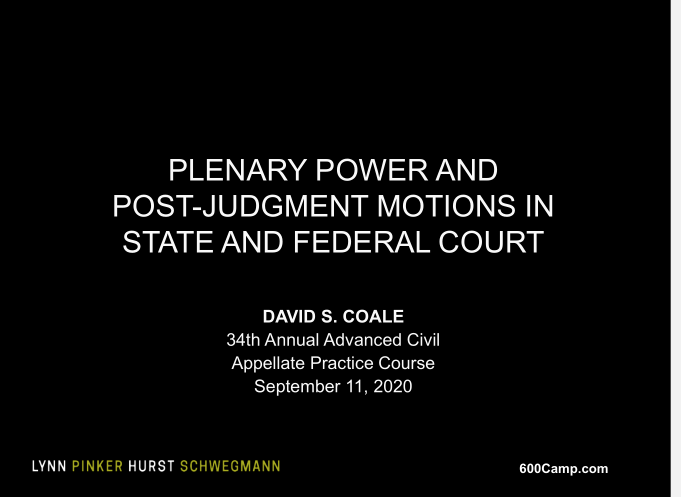 If the details of the virgule are not obscure enough for you, then you will love this wonderful article from Smithsonian Magazine about the “pilcrow,” a/k/a the paragraph symbol.
If the details of the virgule are not obscure enough for you, then you will love this wonderful article from Smithsonian Magazine about the “pilcrow,” a/k/a the paragraph symbol.
Monthly Archives: September 2020
 While Adams v. Alcolac, Inc. presents an exotic dispute –civil liability for the use of mustard gas by Saddam Hussein’s regime–it turns on a fundamental issue of foreseeability under Texas tort (conspiracy) law: “The plaintiffs argue that it was foreseeable that the exported TDG [chemical] would be turned into mustard gas by some ‘nefarious character’ and that it would then be ‘used for terrorist activity.’ Perhaps so, but that misses the point. The question is not whether the plaintiffs’ battery was a foreseeable result of the alleged conspiracy but whether the battery was ‘done in pursuance of the common purpose of the conspiracy[.]’ Because there is no evidence of a common purpose beyond the initial sale and exportation of the TDG, any eventual use of mustard gas on the plaintiffs, even if foreseeable, was not in furtherance of the alleged conspiracy. The plaintiffs’ conspiracy claim thus fails for lack of an underlying tort.” No. 19-40899 (revised, Sept. 25, 2020) (citations and footnote omitted, emphasis added).
While Adams v. Alcolac, Inc. presents an exotic dispute –civil liability for the use of mustard gas by Saddam Hussein’s regime–it turns on a fundamental issue of foreseeability under Texas tort (conspiracy) law: “The plaintiffs argue that it was foreseeable that the exported TDG [chemical] would be turned into mustard gas by some ‘nefarious character’ and that it would then be ‘used for terrorist activity.’ Perhaps so, but that misses the point. The question is not whether the plaintiffs’ battery was a foreseeable result of the alleged conspiracy but whether the battery was ‘done in pursuance of the common purpose of the conspiracy[.]’ Because there is no evidence of a common purpose beyond the initial sale and exportation of the TDG, any eventual use of mustard gas on the plaintiffs, even if foreseeable, was not in furtherance of the alleged conspiracy. The plaintiffs’ conspiracy claim thus fails for lack of an underlying tort.” No. 19-40899 (revised, Sept. 25, 2020) (citations and footnote omitted, emphasis added).
 Badgerow v. REJ Properties, Inc., No 19-30584 (Sept. 11, 2020), applying the McDonnell-Douglas burden-shifting framework, reached the issue of whether there was a fact question on pretext and concluded that there was:
Badgerow v. REJ Properties, Inc., No 19-30584 (Sept. 11, 2020), applying the McDonnell-Douglas burden-shifting framework, reached the issue of whether there was a fact question on pretext and concluded that there was:
“The timing of Badgerow’s firing is highly indicative of motive. According to Badgerow’s version of events the day she was fired, she received a call from Walters who said that he had ‘just got off the phone with Marc Cohen’ and would call her back. When Walters called Badgerow back, he asked her to travel from her office in Houma to his office in Thibodaux so that he could speak with her in person. During their in-person meeting, Walters terminated Badgerow’s employment. Thus, Badgerow’s firing occurred in the immediate aftermath of Walters being informed of Badgerow’s complaints to Cohen. And Badgerow has adduced other significant evidence of pretext. For example, although REJ states that Walters fired Badgerow due to constant complaints from her coworkers, Badgerow asserts that the only explanation he gave for her firing was that she had ‘dinged his perfect . . . record’ with Ameriprise. And Walters admits that immediately before firing Badgerow he ‘told her that Cohen had said he needed to hire a labor attorney and asked “[d]o I have to worry about you suing me?” Finally, although Walters testified that Badgerow’s coworkers had been complaining to him about her behavior for months, Walters seemed determined to keep Badgerow as one of his AFAs until his conversation with Cohen. A reasonable fact finder could infer from this evidence that REJ’s proffered reason for Badgerow’s firing was pretext for unlawful retaliation.”
(citation omitted, emphasis added).
 Certain motions toll the deadline for filing a notice of appeal — but not multiple times: “Here, the Employees filed a motion for judgment as a matter of law and, alternatively, a new trial, on March 12, 2019. The district court entered final judgment on March 27 without expressly addressing that motion, thus implicitly denying it. On April 10, the Employees refiled the motion. The refiled version was identical to the March 12 version that the judgment implicitly denied. It therefore did not toll the appeal deadline and the 30 days began to run with the entry of judgment on March 27. The Employees did not file a notice of appeal until June 12. Because that notice was untimely under 28 U.S.C. § 2107, the Employees’ appeal must be dismissed for lack of jurisdiction.” Edwards v 4JLJ, LLC, No. 19-40553 (Sept. 21, 2020) (on rehearing, footnotes omitted).
Certain motions toll the deadline for filing a notice of appeal — but not multiple times: “Here, the Employees filed a motion for judgment as a matter of law and, alternatively, a new trial, on March 12, 2019. The district court entered final judgment on March 27 without expressly addressing that motion, thus implicitly denying it. On April 10, the Employees refiled the motion. The refiled version was identical to the March 12 version that the judgment implicitly denied. It therefore did not toll the appeal deadline and the 30 days began to run with the entry of judgment on March 27. The Employees did not file a notice of appeal until June 12. Because that notice was untimely under 28 U.S.C. § 2107, the Employees’ appeal must be dismissed for lack of jurisdiction.” Edwards v 4JLJ, LLC, No. 19-40553 (Sept. 21, 2020) (on rehearing, footnotes omitted).
 As society, and the civil justice system, plan a return to more normal operations as the pandemic recedes, Judges Patrick Higginbotham and Lee Rosenthal, and Professor Steven Gensler, have written a perusasive article in Judicature about the importance of 12-person juries in civil cases: “Over the last 40-plus years, the 12- person civil jury has gone from being a fixture in the federal courts to a relative rarity. We should all be concerned. That the Supreme Court has allowed us to use smaller juries does not require us to use them. We can use 12-person juries. The benefits are large; the disadvantages marginal. We’re not suggesting this as a rule or a requirement. We are simply suggesting that judges not reflexively pick six, or eight, or even ten, and instead remember their authority to seat 12. And the great benefits of doing so.”
As society, and the civil justice system, plan a return to more normal operations as the pandemic recedes, Judges Patrick Higginbotham and Lee Rosenthal, and Professor Steven Gensler, have written a perusasive article in Judicature about the importance of 12-person juries in civil cases: “Over the last 40-plus years, the 12- person civil jury has gone from being a fixture in the federal courts to a relative rarity. We should all be concerned. That the Supreme Court has allowed us to use smaller juries does not require us to use them. We can use 12-person juries. The benefits are large; the disadvantages marginal. We’re not suggesting this as a rule or a requirement. We are simply suggesting that judges not reflexively pick six, or eight, or even ten, and instead remember their authority to seat 12. And the great benefits of doing so.”
 In Franklin v. Regions Bank. “Plaintiffs contracted with Regions Bank for it to manage, as their agent, their mineral interests in a large tract of land.” Under Louisiana law, the parties had “a principal-mandatary relationship, which is equivalent to a common-law principal-agent relationship.” In an Erie analysis, the Fifth Circuit noted that after the Louisiana Supreme Court limited a plaintiff’s ability to choose between a contract or tort remedy (with a large potential effect on limitations) in some mandatary relationships, the legislature then “shortened the limitations periods for claims against engineers, surveyors, professional interior designers, architects, real-estate developers, and home inspectors. Instead of shortening the limitations period for all mandataries, the legislature chose to single-out certain professions for special treatment.” After then coupling that observation with general Louisiana legal principles about strict construction of limitation statutes, the Court held that the plaintiffs wereable to choose a tort remedy with a 10-year limitations period. No. 19-30684 (Sept. 18, 2020).
In Franklin v. Regions Bank. “Plaintiffs contracted with Regions Bank for it to manage, as their agent, their mineral interests in a large tract of land.” Under Louisiana law, the parties had “a principal-mandatary relationship, which is equivalent to a common-law principal-agent relationship.” In an Erie analysis, the Fifth Circuit noted that after the Louisiana Supreme Court limited a plaintiff’s ability to choose between a contract or tort remedy (with a large potential effect on limitations) in some mandatary relationships, the legislature then “shortened the limitations periods for claims against engineers, surveyors, professional interior designers, architects, real-estate developers, and home inspectors. Instead of shortening the limitations period for all mandataries, the legislature chose to single-out certain professions for special treatment.” After then coupling that observation with general Louisiana legal principles about strict construction of limitation statutes, the Court held that the plaintiffs wereable to choose a tort remedy with a 10-year limitations period. No. 19-30684 (Sept. 18, 2020).
 A home health care provider, feeling trapped by Medicare’s slow and complex administrative review process, sought relief in court. The Fifth Circuit affirmed the denial of its application for an injunction, observing: “The Constitution entrusts the political branches, not the judiciary, with making difficult and value-laden policy decisions. There were an infinite number of schemes Congress could have reasonably selected. Congress settled on one that guarantees at least two levels of administrative review and judicial review. And in the case of a backlog, Congress provided the ability to bypass long waits on the way to judicial review. Sahara rejected that option. At bottom, Sahara believes a different scheme would be better. But we lack the power to change it.” Sahara Health Care v. Azar, No. 18-41120 (Sept. 18, 2020) (emphasis added).
A home health care provider, feeling trapped by Medicare’s slow and complex administrative review process, sought relief in court. The Fifth Circuit affirmed the denial of its application for an injunction, observing: “The Constitution entrusts the political branches, not the judiciary, with making difficult and value-laden policy decisions. There were an infinite number of schemes Congress could have reasonably selected. Congress settled on one that guarantees at least two levels of administrative review and judicial review. And in the case of a backlog, Congress provided the ability to bypass long waits on the way to judicial review. Sahara rejected that option. At bottom, Sahara believes a different scheme would be better. But we lack the power to change it.” Sahara Health Care v. Azar, No. 18-41120 (Sept. 18, 2020) (emphasis added).
The opinion also provides an original source for the saying, “[t]he best laid plans of mice and men oft go awry” —
 Last week I spoke (virtually) at the State Bar’s Advanced Civil Appellate Course. My topic was post-verdict motions in state in federal court; here is a copy of my PowerPoint.
Last week I spoke (virtually) at the State Bar’s Advanced Civil Appellate Course. My topic was post-verdict motions in state in federal court; here is a copy of my PowerPoint.
 A dispute about an allegedly malfunctioning power generator led to an ingenious but flawed attempt to resolve it in Imperial Indus. Supply Co. v.. Thomas, in two steps:
A dispute about an allegedly malfunctioning power generator led to an ingenious but flawed attempt to resolve it in Imperial Indus. Supply Co. v.. Thomas, in two steps:
- “[Thomas] began by sending Imperial a document titled “ConditionalAcceptance for the Value/For Proof of Claim/Agreement” (“Alleged Agreement”) which purported to be a “binding self-executing irrevocable contractual agreement” evidencing Thomas’s acceptance of Imperial’s offer. , , , The Alleged Agreement further provided that Imperial would need to propound fifteen different “Proofs of Claim” to Thomas in order to avoid (1) breaching the Alleged Agreement; (2) admitting, by “tacit acquiescence,” that the generator caused the fire; and (3) participating in arbitration proceedings.”
- “Then, Thomas sent Imperial two notices related to the Alleged Agreement. The first notice purported that Imperial breached the Alleged Agreement by failing to provide the proofs of claim. This notice allowed Imperial to cure the alleged breach by providing the proofs of claim within three days. In addition, the notice stated that Imperial’s refusal to follow the curing mechanism would result in Imperial’s admission and confessed judgment to the alleged breach. The second notice stated that Imperial owed the balance for the “entire contract value”1 because it did not cure the breach.”
Thomas than obtained a favorable arbitration award against Imperial. Unimpressed, the Fifth Circuit affirmed the district court’s order that vacated the award, noting: “If Thomas’s argument was valid, it would turn the notion of mutual assent on its head in ordinary purchase cases like this one: buy an item from a dealer or manufacturer, then mail a letter saying “you agree if you don’t object,” and you can have whatever deal you want if the dealer/manufacturer doesn’t respond. Thomas fails to cite a single case that would support such a ridiculous notion.” No. 20-60121 (Sept. 2, 2020).
 The Department of Health & Human Services promulgated a new Medicare regulation about compensation for inpatient psychiatric facilities. It established a formula to run from January 1 of one year to January 1 of the next. For 364 days of the year, that worked well enough, but the confusion about what formula applied on January 1 led to litigation. Relying on the concept that a court should “attempt to reconcile . . . competing provisions in a manner that gives effect to each one”–which at times may require it to “dishonor some bit of text” as a preferred alternative to “apply[ing] the unintelligibility canon . . . and . . . deny[ing] effect to both provisions”–the Fifth Circuit concluded that the new year formula would apply on January 1: “That is what context indicates. It is what the agency proposes.” Greenbrier Hospitall, L.L.C. v. Azar, No. 19-30331 (Sept. 9, 2020).
The Department of Health & Human Services promulgated a new Medicare regulation about compensation for inpatient psychiatric facilities. It established a formula to run from January 1 of one year to January 1 of the next. For 364 days of the year, that worked well enough, but the confusion about what formula applied on January 1 led to litigation. Relying on the concept that a court should “attempt to reconcile . . . competing provisions in a manner that gives effect to each one”–which at times may require it to “dishonor some bit of text” as a preferred alternative to “apply[ing] the unintelligibility canon . . . and . . . deny[ing] effect to both provisions”–the Fifth Circuit concluded that the new year formula would apply on January 1: “That is what context indicates. It is what the agency proposes.” Greenbrier Hospitall, L.L.C. v. Azar, No. 19-30331 (Sept. 9, 2020).
 Many opinions address briefing waiver issues by an appellant. But what about an appellee? The Fifth Circuit examined that procedural point in Texas Democratic Party v. Abbott:
Many opinions address briefing waiver issues by an appellant. But what about an appellee? The Fifth Circuit examined that procedural point in Texas Democratic Party v. Abbott:
“Appellate rules regarding how we treat absent issues differ depending on whether it is the appellant or the appellee who has neglected them. An appellant can intentionally waive or inadvertently forfeit the right to present an argument by failure to press it on appeal, a higher threshold than simply mentioning the issue. On the other hand, even an appellee’s failure to file a brief does not cause an automatic reversal of the judgment being appealed. By appellate rule, so extreme a lapse does cause the appellee to lose the right to appear at oral argument. Fed. R. App. P. 31(c). We also know that if we disagree with the grounds relied upon by a district court to enter judgment but discover another fully supported by the record, we can affirm on that alternative basis. . . . There are a few cases that consider rules of waiver even for appellees. For example, our discretion to consider an argument not properly presented is ‘more leniently [applied] when the party who fails to brief an issue is the appellee.'”
No. 20-50407 (Sept. 10, 2020).
 Following two recent opinions about Fed. R. Civ. P. 9(b), the Fifth Circuit again applied it in Waste Management v. AIG: “We need not resolve this dispute because, even assuming that an adjuster can be held liable under [the] Texas Insurance Code . . . Waste did not allege facts that, taken as true, demonstrate a violation of these provisions. The only relevant, AIG Claims-specific facts that Waste alleged in its
Following two recent opinions about Fed. R. Civ. P. 9(b), the Fifth Circuit again applied it in Waste Management v. AIG: “We need not resolve this dispute because, even assuming that an adjuster can be held liable under [the] Texas Insurance Code . . . Waste did not allege facts that, taken as true, demonstrate a violation of these provisions. The only relevant, AIG Claims-specific facts that Waste alleged in its
complaint are that (1) AIG Claims served as the adjuster for ASIC and (2) ‘On July 9, 2013, AIG Claims sent Waste Management a letter denying [certain] coverage . . . .’ These threadbare factual allegations, along with Waste’s conclusory recitation of the elements of a claim under the Texas Insurance Code, are insufficient to state a plausible claim for relief. Notably, Waste did not allege that AIG Claims failed to investigate, delayed any investigation, misevaluated, misprocessed, made any misrepresentation of the policy, or otherwise failed to ‘effectuate’ a fair settlement.” (citations omitted).
 Samuel Williston reviewed many opinions (right) in drafting his influential works on contract law. So too did D2 Excavating, “[a] subcontractor doing excavation work [who] ended up having to remove a lot more dirt from the construction site than the parties anticipated.” But D2 was unable to escape Williston’s black-letter principles, as the Fifth Circuit held:
Samuel Williston reviewed many opinions (right) in drafting his influential works on contract law. So too did D2 Excavating, “[a] subcontractor doing excavation work [who] ended up having to remove a lot more dirt from the construction site than the parties anticipated.” But D2 was unable to escape Williston’s black-letter principles, as the Fifth Circuit held:
- As to the original contract, it noted “tthe basic contract principle that ‘where one agrees to do, for a fixed sum, a thing possible to be performed, he will not be excused or become entitled to additional compensation, because unforeseen difficulties are encountered.'”
- As to a change order: “D2 acknowledges that the alleged consideration was its exporting excess soil. The original contract already obligated D2 to do so without any compensation beyond the contract price. Hauling the dirt, therefore, cannot serve as consideration. The oral change order is void.”
D2 Excavating v. Thompson Thrift Constr., No. 19-40745 (Sept. 2, 2020) (citations omitted).
 Applying Fed. R. Civ. P. 9(b), the Fifth Circuit found no fraud claims stated in:
Applying Fed. R. Civ. P. 9(b), the Fifth Circuit found no fraud claims stated in:
- Colonial Oaks Assisted Living v. Hannie Development, No. 19-30995 (Aug. 25, 2020): “The pleadings are devoid of allegations regarding what instructions the employees received, who gave the instructions, whether anyone followed the instructions, and whether Sellers were aware of the specific instructions given.
- Umbrella Investment Group v. Wolters Kluwer, No. 20-30078 (Aug. 25, 2020): “In this case, the only relevant fact that UIG has alleged beyond what little it alleges ‘on information and belief’ is that Wolters Kluwer provided ‘written certification that the property subject to the loan was not in a flood hazard area that required flood insurance under FEMA regulations pursuant to the Flood Disaster Protection Act of 1973.’ That fact alone can ground nothing more than speculation as to the cause of the error, and therefore, UIG has failed to state a claim for fraud.”